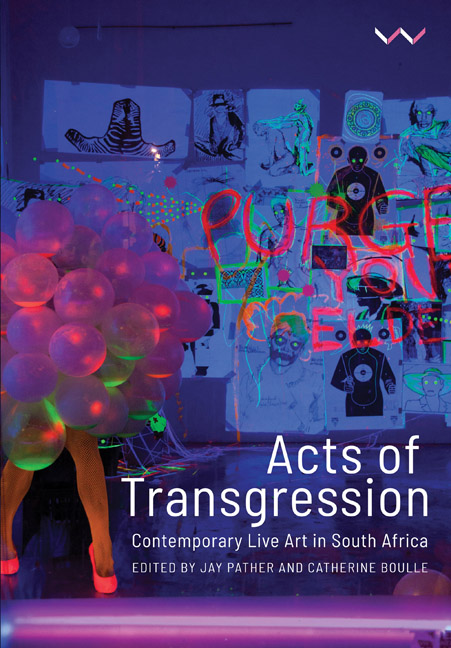Book contents
- Frontmatter
- Contents
- Acknowledgements
- Introduction
- PART ONE LIVE ART IN A TIME OF CRISIS
- PART TWO LOSS, LANGUAGE AND EMBODIMENT
- PART THREE RETHINKING THE ARCHIVE, REINTERPRETING GESTURE
- PART FOUR SUPPRESSED HISTORIES AND SPECULATIVE FUTURES
- 12 To Heal a Nation: Performance and Memorialisation in the Zone of Non-Being
- 13 Astronautus Afrikanus: Performing African Futurism
- 14 ‘Touched by an Angel’ (of History) in Athi-Patra Ruga's The Future White Women of Azania
- 15 Performance in Biopolitical Collectivism: A Study of Gugulective and iQhiya
- Contributors
- List of Illustrations
- Index
15 - Performance in Biopolitical Collectivism: A Study of Gugulective and iQhiya
from PART FOUR - SUPPRESSED HISTORIES AND SPECULATIVE FUTURES
Published online by Cambridge University Press: 30 May 2019
- Frontmatter
- Contents
- Acknowledgements
- Introduction
- PART ONE LIVE ART IN A TIME OF CRISIS
- PART TWO LOSS, LANGUAGE AND EMBODIMENT
- PART THREE RETHINKING THE ARCHIVE, REINTERPRETING GESTURE
- PART FOUR SUPPRESSED HISTORIES AND SPECULATIVE FUTURES
- 12 To Heal a Nation: Performance and Memorialisation in the Zone of Non-Being
- 13 Astronautus Afrikanus: Performing African Futurism
- 14 ‘Touched by an Angel’ (of History) in Athi-Patra Ruga's The Future White Women of Azania
- 15 Performance in Biopolitical Collectivism: A Study of Gugulective and iQhiya
- Contributors
- List of Illustrations
- Index
Summary
In the street performance Indaba ludabi, members of the collective Gugulective handed out leaflets containing political messages to passersby. In Siphi?, Gugulective stormed the opening of their exhibition in balaclavas, simulating the hijacking of their own art. In Portrait, members of the black women's network iQhiya stood motionless on Coca-Cola bottles. In another durational performance Commute, iQhiya held a party in a minibus taxi at the Iziko South African National Gallery and, in a later iteration, in the parking lot of the University of Cape Town's Hiddingh Campus. In these diverse performances, black bodies insert themselves into exclusionary spaces and reclaim these spaces that render them invisible. Their bodies enact a decolonial politics of self-assertion in contested spaces. I call this subject-centred, collaborative practice ‘biopolitical collectivism.’ Biopolitical collectivism is socially engaged participatory art practice that generates subjectivities. While traditional art practices centralise the art object, such as a painting, photograph, video or installation, as the end point of the artistic process and as the locus of aesthetic meaning-making, biopolitical collectivism concerns the production of subjectivities.
Michel Foucault's concept of biopolitics, particularly as it pertains to the work of Achille Mbembe, Maurizio Lazzarato and Antonio Negri, illuminates the ontology and epistemology of biopolitical collectivism. Biopolitics also sheds light on the figure of the postcolonial subject in global capitalism, which is central to contemporary artistic production in Africa. Contrary to the dominant, essentialist art historical discourses that have sought to tie current African cultural practices to a collectivist past, biopolitical collectivism seeks solutions to contemporary problems inside of contemporary aesthetics. Here, I use the framework of biopolitical collectivism to demonstrate how the works of two South African collectives, Gugulective and the younger iQhiya, deploy a subject-centred, performative art practice that resists the capitalist, racist, and sexist colonisation and subjugation of black bodies. The collectives engage a decolonial aesthetic shaped by their lived contemporary South African experience.
Gugulective, a collective originating from the townships of Gugulethu and Langa on the outskirts of Cape Town, is comprised of Athi Mongezeleli Joja, Zipho Dayile, Lonwabo Kilani, Dathini Mzayiya, Khanyisile Mbongwa, Kemang Wa Lehulere, Themba Tsotsi, Loyiso Qanya, Ayanda Kilimane and the late Unathi Sigenu. Gugulective launched their activist art from a Gugulethu shebeen in 2006.
- Type
- Chapter
- Information
- Acts of TransgressionContemporary Live Art in South Africa, pp. 332 - 351Publisher: Wits University PressPrint publication year: 2019



